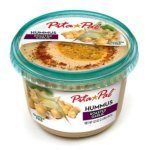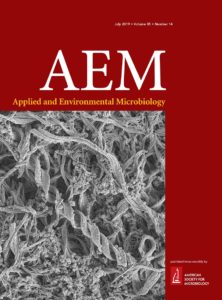The FDA notified on its website that Pita Pal Foods, LP of Houston, TX recalled hummus products made between May 30, 2019, and June 25, 2019, due to Listeria monocytogenes. While not on the product, Listeria monocytogenes was identified at the manufacturing facility during an FDA inspection. The products have been distributed nationwide and to the United Arab Emirates. The products were sold under various brands such as Bucee’s, Fresh Thyme, Harris Teeter, Pita Pal, Reasor’s, Roundy’s, Schnucks, 7-Select, Lantana, and others. @ https://www.fda.gov/safety/recalls-market-withdrawals-safety-alerts/pita-pal-foods-lp-recalls-various-hummus-and-dips-due-possible-health-risk?utm_campaign=Pita%20Pal%20Foods%2C%20LP%20Recalls%20Various%20Hummus%20and%20Dips&utm_medium=email&utm_source=Eloqua
ruth
Pita Pal Foods, LP of Houston, TX has issued a voluntary recall of certain hummus products made between May 30, 2019 and June 25, 2019, due to concerns over Listeria monocytogenes, which was identified at the manufacturing facility (not in finished product) during an FDA inspection.
ruth
The FDA announced on its site that Growers Express had expanded the list of select fresh vegetable products affected by the recall that was issued on July 1, 2019. After further testing of an additional product lot from the suspected source of the recall, a single retail sample was found to be positive for Listeria monocytogenes. As a result, the company has expanded the list of recalled products to include certain specific fresh Brussels sprouts, fresh cauliflower florets, and fresh green beans products. The products originated from a Growers Express production facility in Biddeford, Maine and were distributed to the states of Massachusetts and Maine. Growers Express is no longer sourcing vegetables from the suspected cause of the contamination. There are no reported illnesses to date. @ https://www.fda.gov/safety/recalls-market-withdrawals-safety-alerts/growers-express-expands-voluntary-recall-select-fresh-vegetable-products-due-potential-contamination?utm_campaign=Growers%20Express%20Expands%20Voluntary%20Recall%20of%20Select%20Fresh%20Vegetable%20Products&utm_medium=email&utm_source=Eloqua
Growers Express takes issues of food safety seriously and in an abundance of caution and in the interest of protecting consumers is expanding the list of select fresh vegetable products affected by a voluntary recall that was issued on July 1, 2019. After further testing of an additional product lot
ruth
According to a statement from the New York State Department of Health, the Albany County Department of Health, Montgomery County Public Health, Saratoga County Public Health, and Schenectady County Public Health Services a Cyclospora outbreak has sickened at least 11 people. Implicated establishments include The Italian American Community Center in Albany, A buffet during a private graduation event at Union College in Schenectady, and Prime Life Restaurant at Beltrone Senior Living Community Center in Colonie.@ https://foodpoisoningbulletin.com/2019/new-york-cyclospora-outbreak-sickens-eleven-people-more-may-be-diagnosed/
A New York cyclospora outbreak has sickened at least 11 people; more may be diagnosed. Some ate at American Community Center in Albany.
ruth
An article published in Appl Environ Microbiol (Ferrari RG, Rosario DKA, Cunha-Neto A, Mano SB, Figueiredo EES, Conte-Junior CA. 2019. Worldwide epidemiology of Salmonella serovars in animal-based foods: a meta-analysis. Appl Environ Microbiol 85:e00591-19), is attempting to understand the global epidemiology of Salmonella serovars, and their prevalence in animal-based foods (beef, pork, poultry, and seafood) throughout the world. The research found that S. Typhimurium was reported in all four matrices and continents. Poultry continues to play a central role in the spreading of the Enteritidis serovar to humans, and Anatum and Weltevreden were the most frequently found in beef and seafood, respectively. The authors recommended careful monitoring of certain serovars, such as Derby, Agona, Infantis, and Kentucky. @ https://doi.org/10.1128/AEM.00591-19
Salmonella spp. are among the most important foodborne pathogens and the third leading cause of human death among diarrheal diseases worldwide. Animals are the primary source of this pathogen, and animal-based foods are the main transmission route to humans. Thus, understanding the global epidemiology of Salmonella serovars is key to controlling and monitoring this bacterium. In this context, this study aimed to evaluate the prevalence and diversity of Salmonella enterica serovars in animal-based foods (beef, pork, poultry, and seafood) throughout the five continents (Africa, the Americas [North and Latin America], Asia, Europe, and Oceania). The meta-analysis consisted of a chemometric assessment (hierarchical cluster analysis and principal component analysis) to identify the main epidemiological findings, including the prevalence and diversity of the Salmonella serovars in each matrix. Regarding the serovar distribution, S . Typhimurium presented a cosmopolitan distribution, reported in all four assessed matrices and continents; poultry continues to play a central role in the dissemination of the Enteritidis serovar to humans, and Anatum and Weltevreden were the most frequently found in beef and seafood, respectively. Additionally, we recommended careful monitoring of certain serovars, such as Derby, Agona, Infantis, and Kentucky. Finally, given the scientific data regarding the most frequently reported serovars and which matrices constitute the main vehicles for the transmission of this pathogen, control programs may be improved, and specific interventions may be implemented in an attempt to reduce the risk of this pathogen reaching humans.
IMPORTANCE Salmonellosis is caused by Salmonella spp. and is the third leading cause of death among food-transmitted diseases. This pathogen is commonly disseminated in domestic and wild animals, and the infection’s symptoms are characterized by acute fever, nausea, abdominal pain, and diarrhea. The animals are the primary source of salmonellae, and animal-based foods are the main transmission route to humans. Therefore, data collected from these sources could contribute to future global interventions for effective control and surveillance of Salmonella along the food chain. In light of this, the importance of our research is in identifying the prevalence of Salmonella serovars in four animal-based food matrices (pork, poultry, beef, and seafood) and to evaluate the importance that each matrix has as the primary source of this pathogen to humans.




